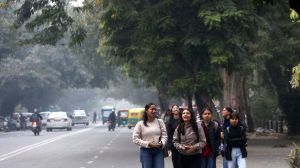“There is no major fiscal impact seen for five years (from the food grains subsidy extension),” the official said. On Saturday, Prime Minister Narendra Modi during a pre-election rally in Chhattisgarh, announced that the central government would continue to provide free foodgrains to beneficiaries under the National Food Security Act, 2013 for the next five years. The PMGKAY was to end this December. The extension of the free ration scheme is expected to benefit around 80 crore people and could be a key element of the BJP’s 2024 Lok Sabha campaign narrative.

This comes at a time when the government is facing fiscal strain on account of elevated fertiliser and fuel subsidies. The fiscal spend on the food grains scheme was flagged earlier as a concern by the Department of Expenditure, Ministry of Finance in June 2022. In an internal note it had stated that it is not advisable to continue the PMGKAY beyond its extension till September 2022 both on “grounds of food security and on fiscal grounds” given that it is as it is “far beyond the need of non-pandemic times”. “The budgeted fiscal deficit at 6.40 % of GDP was itself extremely high by historical standards, and deterioration therein poses a risk of serious adverse consequences. It is vital that major subsidy increases/tax reductions are not done. In particular, it is not advisable to continue the PMGKAY beyond its present extension, both on grounds of food security and on fiscal grounds. As it is, each family is getting 50 kg of grains, 25 kg at a nominal price of Rs.2/Rs.3, and 25 kg free. This is far beyond the need at a non-pandemic time,” the Expenditure Department had then said.
The fiscal numbers so far for this year show that the Centre has spent Rs 42,200.69 crore on nutrient-based fertilisers subsidy during April-September 2023, up 56 per cent from Rs 27,006.56 crore spent in the year-ago period, while Rs 67,926.21 crore has been spent on urea subsidy during the first half of the fiscal as against Rs 54,718.78 crore last year. On the fuel subsidy front, the government has spent Rs 1,119.17 crore in April-September as against Rs 944.35 crore in the corresponding period last year.
The situation is a tad comfortable for food subsidy, where the government has spent Rs 95,149.44 crore on food subsidy during April-September as against Rs 1,16,209.54 crore spent during the corresponding period last year.
Economists said the extension of the free food grains scheme reflects difficulty in withdrawing populist policies and though it is likely to have a limited near-term impact, it will add to the medium-term risks.
“We had expected a six-month extension instead. In our view, this reflects the difficulty in withdrawing populist policies, especially ahead of elections. The near-term macro implications should be muted. The 5 kg free food grain scheme (costing Rs 2 lakh crore or 0.7 per cent of GDP annually) was subsumed within the government’s existing scheme of 5 kg of subsidised food grains. That said, higher revenue expenditure, including on rural employment guarantees, could impact the government’s FY24 fiscal deficit target of 5.9 per cent of GDP,” Nomura said in a note. “Over the medium term, the government is likely to forgo revenues from its subsidised food sales (0.05 per cent of GDP on an annualised basis). As procurement costs increase, the food subsidy bill will also increase over time. Importantly, while the need for subsidised grains for lower income households is undeniable, there are risks with announcing free schemes that lead to competitive populism,” it said.
Story continues below this ad
Devendra Kumar Pant, Chief Economist, India Ratings and Research said the food subsidy is likely to be Rs 11.6 lakh crore during financial year 2024-25 to 2028-29, with the subsidy on food seen to be Rs 2 lakh crore in FY24 and Rs 2.1 lakh crore next fiscal. “The exact fiscal impact of the scheme will depend on three factors — the number of beneficiaries, the quantity of food grains distributed and the economic cost. Demand is unlikely to change, grains have been supplied under this scheme from the last six months, so the trend is known. But there may be an impact if procurement prices increase, then market prices will also increase though not in the same proportion. Food subsidy will change then because of the change in economic cost, which includes procurement price, mandi charges, distribution cost etc. Main impact on prices may come from the supply side given the El Niño weather conditions. The crucial factor then would be whether the government will be able to procure so much after supplying to these 80 crore people and whether they will still have additional stocks to intervene in the market,” he said.
The central government had launched the PMGKAY scheme in April 2020 under which kg of free foodgrains was provided to every person on top of their NFSA entitlement of foodgrains at subsidised rates. The Central government provides foodgrains to people – rice at Rs 3 per kg, wheat Rs 2 per kg, and coarse grains Rs 1 per kg – under the National Food Security Act (NFSA). In December last year, the Government amalgamated PMGKAY with NFSA and decided to provide free foodgrains to beneficiaries under the NFSA, as per their entitlement, for a year beginning January 2023. The NFSA covers about 81.35 crore people and the Centre had said that it would bear the entire cost of Rs 2 lakh crore to provide them food security.
In Budget 2023-24, the government had allocated Rs 1.97 lakh crore crore for food subsidy, which was lower than Rs 2.87 lakh crore crore revised estimate for 2022-23. Also, Rs 1.75 lakh crore was allocated for fertiliser subsidy for FY24 as against Rs 2.25 lakh crore in the revised estimate for 2022-23 and Rs 2,257 crore for petroleum subsidy as against Rs 9,171 crore in the revised estimate for FY23.
The central government’s fiscal deficit during April-September widened to Rs 7.02 lakh crore or 39.3 per cent of the full-year target of Rs 17.87 lakh crore compared with Rs 6.43 lakh crore in April-August. Despite concerns about rise in borrowing costs with an increase in yields on government securities and possibility of strain on public expenditure amid global uncertainties, the government is confident of meeting its fiscal deficit target.
Story continues below this ad
The government is, however, exploring options to reduce debt, with some of the measures being taken similar to the ones being taken by developed economies such as the US. The government is exploring all options including converting debt into longer tenure from shorter tenure and taking measures to reduce the high interest cost for debt, the government official cited above said. “There are many options and we will try every option,” the official said, adding that a lower dependence on government bonds may not be an immediate option.

































